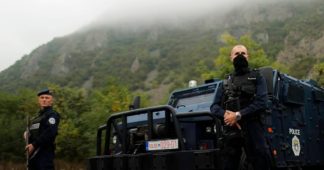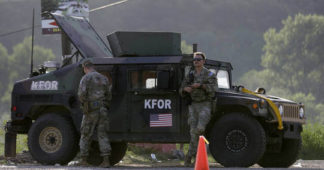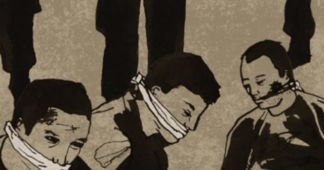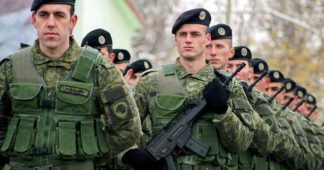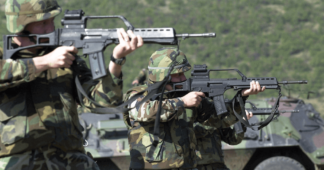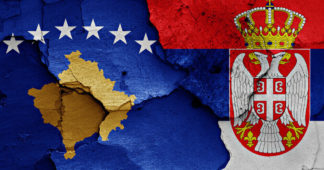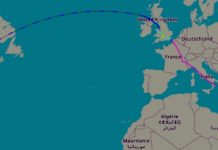by Sergio Cantone
Serbia’s path to EU membership now depends on its silent consent for Kosovo’s assent to international organisations, such as the UN and Council of Europe.
EU foreign affairs ministers gathering in Luxemburg on 22 April agreed to amend a key part of the document concerning Serbia’s negotiations to join the EU, known as Chapter 35.
The change means Brussels will freeze Serbia’s accession process into the bloc if it doesn’t implement an agreement on normalising its relationship with Kosovo.
The main condition for Serbia to comply with is that it must stop obstructing Kosovo’s efforts to join key international organisations.
Kosovo has taken diplomatic steps to join the UN, Council of Europe, EU and NATO since declaring independence from Serbia in 2008.
Belgrade rejects Kosovo’s independence. As a UN member, it fears accepting Kosovo’s membership of these institutions will implicitly recognise its statehood.
With the situation reaching a stalemate, EU foreign ministers added the so-called Ohrid agreement into Chapter 35, which aims to “normalise” Serbia and Kosovo’s almost three decades old tumultuous relationship.
The agreement takes its name from the lake of Ohrid, the North Macedonian resort where it was signed in the spring of 2023 to reaffirm and relaunch the Brussels agreement of 2013.
This deal struck between Brussels, Serbia and Kosovo recognised the governing authority of Kosovan institutions.
Revitalising an agonizing EU-brokered deal
Only a few commitments in this document have been implemented by both Kosovo and Serbia.
This is why the EU foreign ministers have made provisions in the Ohrid agreement binding clauses for Serbia, as sort of take-it-or-leave-it benchmark.
Not only will Serbia have to avoid obstructing Pristina’s aspirations to join international organisations, it will also have to recognise official administrative documents issued by the Kosovan administration, such as the license plates and the passports with the national symbols of Kosovo
Such matters have been systematically opposed by the Serbian government since the 1999 war with NATO that imposed the separation of Kosovo.
Kosovo was formerly an autonomous province within Serbia when the two entities were part of Yugoslavia, which disintegrated in 1991.
The conditions brought in on 22 April by the EU create a political jigsaw for Belgrade putting its political leadership and the entire Serbian society in front of an excruciating dilemma: Either it starts a slow and progressive process of recognition of Kosovo or it must forget about any medium-term hope of EU membership.
Serbia has so far avoided any step that could be identified as a de facto recognition of the Kosovan statehood.
On 21 April, Serbs living in Kosovo largely ditched a referendum called by the Kosovan administration, according to the government of Pristina, to resolve the issue of mayors in Kosovo’s Serbian majority municipalities.
The issue has been pending since November 2022, when Serbian policemen, mayors and judges of northern Kosovo resigned to protest what they claimed was the “breaching” of EU-brokered agreements by the Kosovan authorities
Self-management versus self-determination
This question of Serbian mayors is directly linked to the Ohrid agreements, too.
In the text, Kosovo agreed “to ensure an appropriate level of self-management for the ethnic Serbian community in Kosovo” and allow the Serban municipalities to closely align.
However, Serbs living in the north claim Pristina opposes the creation of the “association of the Serbian municipalities.”
There are four Serbian-majority cities in northern Kosovo: North Mitrovica, Leposavić, Zvečan and Zubin Potok.
This Serbian-majority area in Kosovo is dominated by _Srpska Lista (_the only political party for the Serbian community).
Pristina alleges this party is directly instructed by Belgrade, especially the nationalist-conservative Serbian President Vučić.
The Kosovan government claims local Serbs are acting in cahoots with Belgrade, meaning it is reluctant to make concessions on the autonomy of the Serbian territories.
“We don’t want the Northern part of our country to be transformed into a kind of Republika Srpska,” said leftist nationalist Kosovo prime minister Albin Kurti, referring to the autonomous Serbian entity in Bosnia Herzegovina.
Kosovo cannot accept an integrated and autonomous Serbian administration within its territory along the border with Serbia, a country that doesn’t recognise its independence.
Meanwhile, Serbs are afraid that by cutting ties with the motherland they could become second-class citizens in a country that will discriminate against them.
Council of Europe and Kosovo – new blow for Belgrade
Kosovo has recently obtained relative political success.
On 17 April, the Parliamentary Assembly of the Council of Europe (CoE) approved the recommendation for Kosovo to become its 47th member state, provoking rage in Belgrade.
President Vučić said that “if Kosovo joins the CoE, Serbia is ready to put into question its own membership of the Council of Europe”.
Serbia has conducted massive military drills at the borders with Kosovo to show its deep disappointment with the decision by the Strasbourg-based human rights organisation.
The decision of the CoE assembly was taken after Kosovo gave back land to the Serbian Orthodox Church belonging to the Monastery of Dečani.
International organisations had requested that Kosovan authorities take this step.
The EU, Serbia and Russia
In December 2023, Serbian president Vučić declared that “he does not think it is possible for the Ohrid Agreement to be included in Chapter 35, because this would de facto means to close the door (of the EU) for Serbia.”
According to an April 2022 IPSOS poll, the number of Serbs opposing EU membership was more than those in favour of it for the first time.
This poll found that the majority of Serbs think the EU is procrastinating when it comes to enlargement, with the bloc unwilling to admit new members.
Serbians’ lack of faith in Brussels appears to reflect some truth.
A recent March 2024 IPSOS/Euronews poll revealed a majority of EU voters are against further enlarging the union.
Relations among Serbia, the EU and NATO have suffered amid the Russian invasion of Ukraine, since Belgrade has not joined EU sanctions against Moscow – despite its candidacy.
Western capitals view Kosovo as a potential source of instability in the heart of Europe.
Belgrade and Pristina don’t trust each other. Both are afraid to make concessions that could be betrayed by their counterpart.
Kosovo’s security is assured by the presence of NATO and the EU’s support of organisations that promote the rule of law.
Still, the spectre of instability looms large.
We remind our readers that publication of articles on our site does not mean that we agree with what is written. Our policy is to publish anything which we consider of interest, so as to assist our readers in forming their opinions. Sometimes we even publish articles with which we totally disagree, since we believe it is important for our readers to be informed on as wide a spectrum of views as possible.
